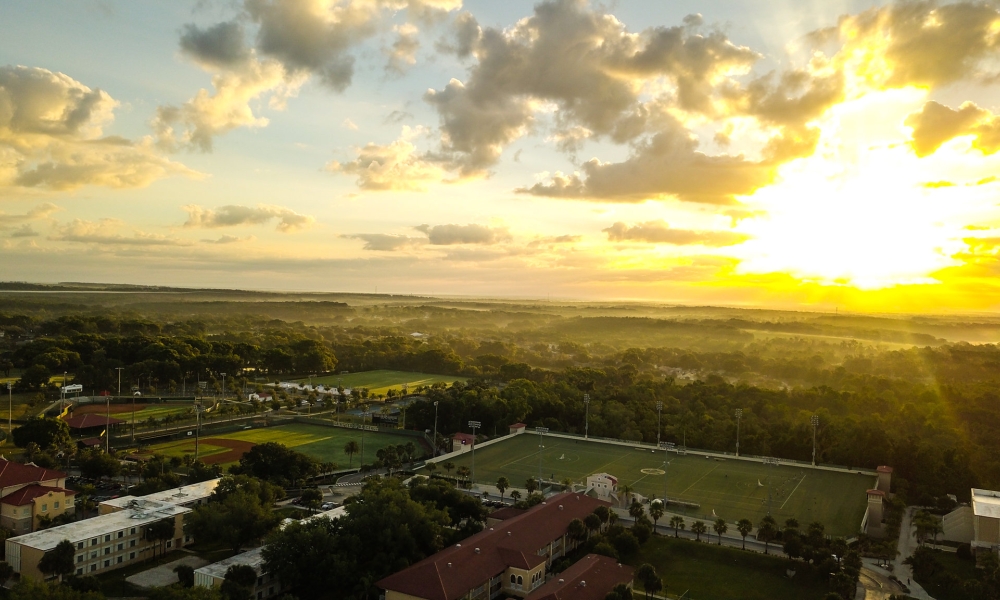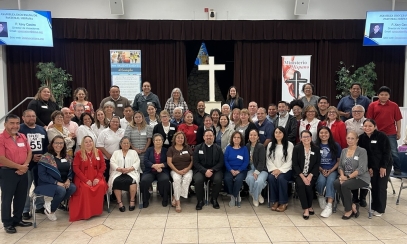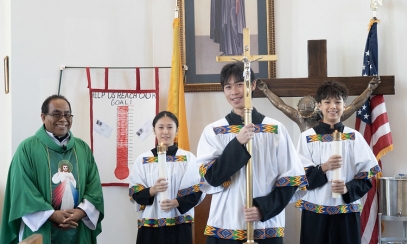
Saint Leo University Faculty Offer Advice on Being Well in Mind, Body, and Spirit in the New Year
Have you already forgotten your New Year’s resolutions or a commitment to planning a household budget, praying more, or heading to the gym? It’s not too late!
Have you already forgotten your New Year’s resolutions or a commitment to planning a household budget, praying more, or heading to the gym? It’s not too late!
Saint Leo University focuses on growth in mind, body, and spirit, and it is a part of the university's Benedictine Catholic heritage. St. Benedict emphasized that those three areas build the whole person, and said we should make time for all three in our daily lives.
To assist with our personal development, three Saint Leo University faculty members offer advice for being well in mind, body, and spirit in 2025.
MIND
“We live in a busy society and many individuals have little time for leisure and time to relax,” said Dr. Tammy Zacchilli, professor of psychology in the College of Arts, Sciences, and Allied Services. “A new year is a great time to find new ways to cope with stressors and focus on being well in mind.”
Some tips from Zacchilli include:
• Spend time outdoors and exercising. “You do not need to set up a strenuous exercise routine. Even going for a walk and getting fresh air can improve your mood and help you cope with stress.”
• Check out relaxation or mindfulness techniques. “These will improve your overall mood and help you deal with daily stressors,” Zacchilli said. “Mindfulness techniques, or meditation, can reduce stress, anxiety, pain, depression, insomnia, and even high blood pressure. Meditation can improve sleep and attention and can help prevent job burnout. Meditation can include taking time to pay attention rather than getting caught up in the busyness of the world around us. It can also include living in the moment, breathing exercises, and accepting yourself. There are also more structured meditation techniques that can be implemented such as sitting mediation, walking meditation, or body scan meditation.”
• Improve time management skills. “We might need to remind ourselves that it is OK to say ‘no’ especially if we feel overwhelmed. Keeping a planner and/or a to-do list can also alleviate stress.”
• Get support. “If you choose to set any of these goals or other goals for the new year, find a family member or friend who can be supportive during the process. This person can keep you accountable and perhaps you can do the same for them. Social support is beneficial in all areas of life so find that support person that can be there to provide guidance or just listen.”
BODY
“Body, mind, and spirit are interwoven and all impact on health,” said Dr. Kathleen Van Eerden, dean of the College of Health Professions, who also is a registered nurse. “Physical health is a dimension that impacts overall health. Nutrition, activity, and healthy habits impact overall physical well-being.”
Van Eerden offers this advice:
• Make good nutrition choices: “The nutrition choices that are made daily for ourselves and our families support physical well-being and affect our lifestyle and longevity. A variety of healthy foods and calorie control can impact weight and obesity. Healthy weight lowers the risk of heart disease, type 2 diabetes, and some types of cancer.”
• Be active: “An active lifestyle that includes moderate physical activity of at least 2½ hours a week is of benefit. Sedentary behavior has been correlated with some medical problems and movement benefits overall health. In addition, strength training of major muscle groups two or three times a week builds muscle and supports bone health.”
• Adopt healthy practices: “Healthy choices promote longevity and overall health. A nutritious diet, exercise, restful sleep, quitting smoking, limiting, or avoiding alcohol and drugs, and stress reduction are factors that promote health.”
SPIRIT
“There are several practices that I use throughout the year that can be particularly helpful when preparing for the new year,” said Dr. Randall Woodard, professor of religion and theology, director of graduate theology, and chair of undergraduate religion and philosophy. “They are simple, and they revolve around looking back, looking forward, and looking at my relationships.”
Woodard offered some suggestions:
• Create time for personal reflection and looking back: “I tend to spend time considering my ultimate purpose,” Woodard said. “For me as a Catholic, this relates to loving God and my neighbor, among other things. Taking time to pray and reflect on my ultimate purpose allows me the chance to give an honest inventory of how I did over the course of the past year. This typically is called an examination of conscience, and there are plenty available online resources for me to use. Looking back is helpful, not to beat myself up, but to inform my commitment to improvement in 2025.”
• Ask yourself specific questions: “I connect those to my relationship with God, my spouse, kids, extended family, colleagues, acquaintances, strangers, and those in need, and how I’ll develop each of those relationships next year. What’s lacking, needs to be changed, and dropped or added so I can better love God and others? Who helps get me moving toward my true purpose and how can I better develop that relationship next year? What specific practices enable or encourage my spiritual development and growth, and how can I better use these to love more fully. What joys does God put in my heart and how can I better listen to God’s voice this year?”
• Make a plan: “After reflecting, I tend to pick one to two elements of development and make a concrete plan that involves when, where, and how I will change. Finally, I take inventory of my relationship with myself. If you are like me, I must promise to silence the overly critical voice in my own head and commit to care for me as well as others.”
• Ask others for an assessment of how you could change or grow: “In addition to personal reflection on how I did last year and what I want to change in the next, I find it helpful to ask those who know me how I can improve. It’s threatening and involves deep vulnerability but asking my wife how I can better love her and how I can better serve her brings incredibly fruitful information. The same is true for my kids. I just have to be prepared for their honesty and their vulnerability.
“Finally, with that examination of conscience, I ask God to show me where I can be more faithful, loving, and full of hope. That feedback helps me look back, plan forward, and prioritize relationships with God and others in a very busy world



